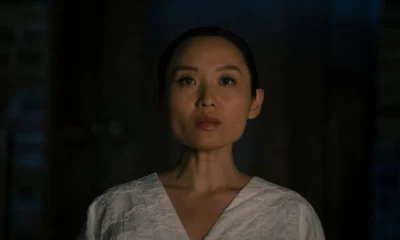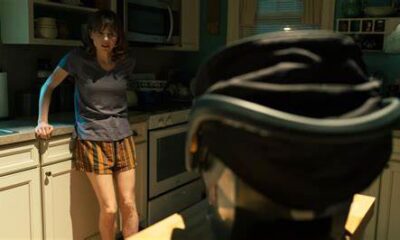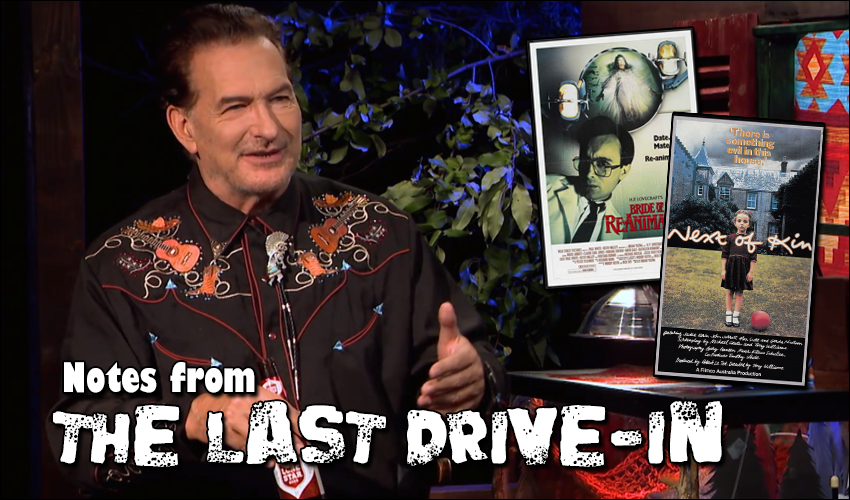
Notes from the Last Drive-In: S3E3 – Bride of Re-Animator and Next of Kin
Welcome to Notes from the Last Drive-In. Normally these go up on Mondays, but some real-life engagements delayed my chance to view the films and write the review. This week we cover two 1980s films with 1989’s Bride of Re-Animator and 1982’s Next of Kin. Two wildly divergent films paired up, splattery pulp and an artsy slow burn, but welcome nonetheless. It’s another movie night on Shudder with the world’s greatest host. Let’s dive in, shall we?
This week’s tweets were handled by Payne and some of our other writers. Thanks for covering, gang! Give them a follow.
Bride of Re-Animator (1989)
Opening: The character reversal of the City and the Town
With Bride of Re-Animator the luster of the original film shines brighter, but it’s not as though Bride is a dull film. It’s effective, technically sound, and features many things to love. But it is the first of what would be many lesser sequels – still fun, but incapable of quite capturing what worked so well with the 1985 original. Most of the pieces are there, and the film largely succeeds in its ambition to follow up on Herbert West and Dan Cain’s exploits. Yet something is missing. The film fell under the direction of Brian Yuzna and a script cobbled together quickly by Yuzna, Rick Fry, and Woody Keith. As a whole it is serviceable, but there is a distinct lack of the late Stewart Gordon. one wonders how things might have turned out if production wasn’t rushed to get a sequel made for a tax credit.
Despite the quibbles one may have with the fairly obvious Frankenstein-riff of a plot and the lesser writing and direction compared to the first, much of the film largely works and works well. The performances are excellent, with Jeffrey Combs and Bruce Abbott returning as West and Cain, respectively, the comical and ridiculous return of David Gale, and the fantastic performance of Kathleen Kinmont as the titular “bride.” The film is also technically strong, with some interesting tricks behind the camera at Yuzna’s direction and masterful effects by Screaming Mad George. Yet… the compromises are one too many for the film to truly live up to the original. No Gordon, a rushed script, and a planned finale that would never be filmed. It’s frustrating, really.
Most of my enjoyment of the first half of the night came from seeing what Jeffrey Combs is up to, as he was beamed onto the set with the socially-distance mannequin. We really should see if the mannequin has a name, honestly. The interviews do feel a little flat as a whole due to social distancing – they certainly lack a certain spontaneity that we’ve enjoyed in prior seasons, but they’re still quite fun. It helps that Jeffrey Combs is a perfect Drive-In guest: a living legend with some surprises, such as his slipping in and out of his redneck roots. We also received a number of fun anecdotes about the shoot, Combs’ continued friendship with Bruce Abbott, and hints about where the series could have headed. Of course, Combs is still game to do another Re-Animator film. Who else could play Herbert West, really?
Joe Bob Briggs generously gave Bride of Re-Animator the four-star treatment. I think Joe Bob has been a bit generous as of late, perhaps slowly losing his mind from cabin fever. It’s a good movie, but is it a four-star film by Drive-In standards? I am not so sure – the original Re-Animator? Undoubtedly. Bride, not really. As for me, I’d give Bride of Re-Animator four out of five Cthulhus.
 (4 / 5)
(4 / 5)
Best Line: “He’s a wife-beater, Dan, use the gun!” – Herbert West being helpful
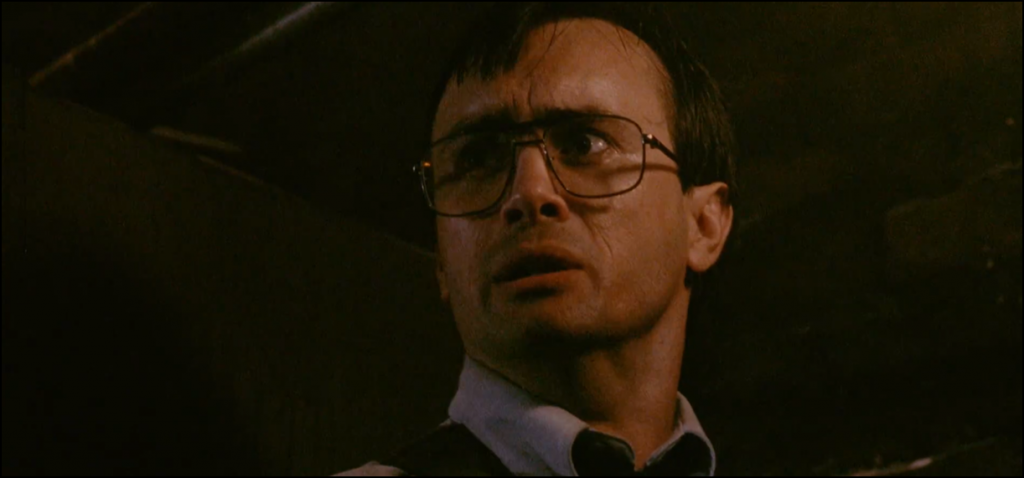
Next of Kin (1982)
Opening: The Dyson Airblade
Next of Kin is an obscure, slow-burn Australian horror film, and yes, despite the wishes of the director, it is horror. As Joe Bob said last week, we know horror when we see it. It is probably the slowest burn on The Last Drive-In, but as someone who enjoys when horror takes its time, I found myself enjoying it a great deal. It is not without problems, however, perhaps grasping too ferociously at prestige, the film ultimately offers short bursts of mood between needlessly labored plot revelations. It’s fine, a good effort for first-time horror director/writer Tony Williams. He wasn’t long for the movie industry, ultimately turning to the advertising industry, but Next of Kin is like a tantalizing peek at what could have been an impressive film career.
The film follows a woman, Linda, who inherits an old folk home who sees a series of deaths of the elderly residents that evokes something from her past. It is a film of family secrets and the threat of madness that muddies the waters of what is real and what isn’t, yet the film doesn’t really commit to the supernatural vs. reality angle much at all. It is a haunted house story where the haunting is all in the mind and the threat is a strange, not necessarily satisfying reveal. The performances are solid, with Jackie Kerlin selling her tormented character with much skill – only to leave the film industry altogether. A strange turn on what could have been a promising career, but one mustn’t begrudge her choices.
Ultimately, much like how Jackie Kerlin left the film industry and Tony Williams transitioned to the ad industry, the film itself feels like a strong start with a sudden stop. So much potential lays within the bones of the story, but it gets traded for plodding pace, a non-sensical revelation, and an out-of-place explosive finale. So much potential and style just sort of squandered. Joe Bob discusses this film in the context of a rediscovered gem, a limited release that was given a new lease on life after a name drop from Quentin Tarantino. Yet, I can’t help but think the value of Next of Kin is in some admittedly stylish directorial choices and the sheer curiosity of it all. It isn’t quite Ozspoitation, nor is it totally inscrutable for the art-house crowd. It’s an odd film from Australia, albeit one that causes me to ponder the question of “what if?”
Joe Bob’s assessment of the film puts it in the four-star territory. I find myself disagreeing, heavily. What works in the film works, in spite of the issues with the plot and what feels like a desperate bid for cultural excellence. I can’t see myself giving this film more than three out of five Cthulhus.
 (3 / 5)
(3 / 5)
Best Line: “Sex it up, baby!” – Joe Bob Briggs on making films, the AMERICAN way.
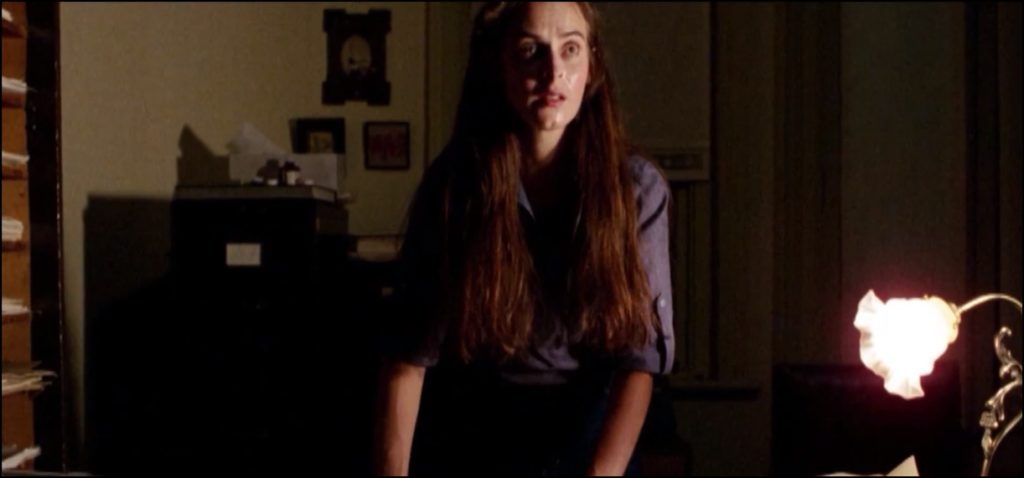
Haunted MTL Drive-In Totals
As always, we have our own Drive-In totals to share!
- 8 months later and 10,000 miles away
- “30 Fucking Iguanas”
- 4 Effects Companies
- 2 Heads in a Bucket
- 20 Appliances on Kathleen Kinmont
- Dead Dog
- Nudie Pen
- Hitchcockery
- Spontaneous Carpentry
- Gratuitous G’Days
- Cat Calling
- Michigan J. Froggery
- One-Act Frankensteinery
- Lizard Stuffing
- Gratuitous Calculation
- Heartwarming Letter Reading
- Super Bingo Hall Freakout
- Superman Joking
- Disney Joking
- Yuki Count: 3
- Season 4-Star Count: 5
- Silver Bolo Award: The Losers Club
- Darcy Cosplay: The Bride
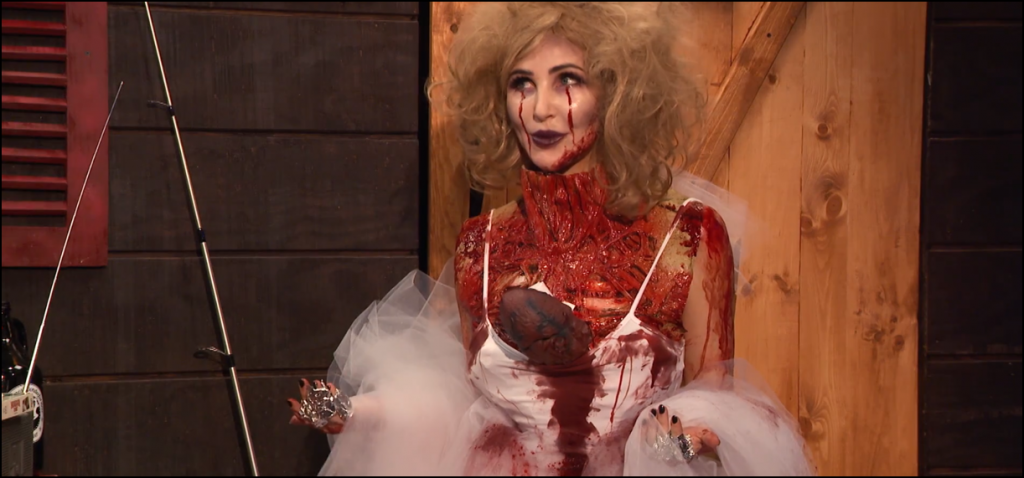
Episode Score
Ultimately, not the finest night at the Drive-In, but still very fun. Who doesn’t love movie night? That being said, Herbert West carries the night, thanks to a game Jeffery Combs, who is as delightful now as he seems to have always been.
 (3.5 / 5)
(3.5 / 5)
See you all next week for more Drive-In fun. I’ll be live-Tweeting the show from Haunted MTL’s Twitter account again (thanks for filling in this week, Payne), so be sure to give us a follow there.
Movies n TV
Wheel of Time A Question of Crimson Is a Political Espionage Delight
Episode two of Wheel of Time felt like the beginning of a long journey. Stories are unfolding, lives are changing, and blood is spilling.
Let’s discuss.
The story
We begin this episode in the past with Elayne’s mother, Queen Morgase. It turns out her rise to the throne was a bit, shall we say, cutthroat. So when she shows up at the White Tower, Siuan is concerned.
She might have reason to be, too.
Meanwhile, Rand, Egwene, Moiraine, Lan and Aviendha are in the Spine of The World. As they travel through some of the most breathtaking lands I have ever seen on a TV show, Egwene is plagued with nightmares. We think at first that’s just her trauma working itself through her system. But we soon find out that it might not be that straightforward.
Finally, Perrin returns home to heal after his hand is almost cut in half. But when he gets there he finds the town has been infested by Children of The Light. And they’re looking for him.
What worked
There was something heartwarming in this episode about political espionage and choking religious persecution. And that is Elayne’s relationship with her family.
I have consumed a lot of fantasy content with royal families. And I have never once heard a princess call her mother ‘Mum’. I’ve never seen royal siblings get along. And I have sure as hell never seen a princess have a good relationship with her step-parent.
This was refreshing. Even though Queen Morgase is kind of a horrible person she seems like a good mother. And that’s an unexpected delight.

Of course, this is just one storyline among many. And while this can sometimes be overwhelming, in this case it wasn’t.
I’ll be honest, some of these storylines are going to drag for me. I know this because I’ve read some of the Wheel of Time books and I have an idea that not all the characters exactly pique my interest.
No one likes all the characters. No one likes all the storylines. While I am here for the political espionage between Queen Morgase and Siuan, not everyone likes it. While others might be fascinated with Selene trying to win Rand back, I couldn’t care less.
Having multiple storylines keeps everyone’s attention better. So long as things don’t get out of hand. Things can easily get out of hand. But this seems to be managed well.
So far.
What didn’t work
As I mentioned above, I’m not thrilled with Rand’s story at this point. And while it’s fine to not like a storyline when there are this many to choose from, it’s not fantastic that the one I like the least is the one involving our two main characters. And anytime we were with the team at the Spine of The World, the only thing that brought me joy was Moirain’s hat. It reminded me of Stockard Channing’s hat in Practical Magic.
The problem is that Rand is Charlie Brown with controversial magical powers. He is boring, serious, and pessimistic.
And yes, I understand that he has a heavy emotional burden and he’s the Dragon Reborn and that’s quite taxing and all. But let’s be fair, there isn’t a single person in this show that doesn’t have a heavy burden. And most of them manage to be fun occasionally.

All that being said, this episode of Wheel of Time did exactly what it needed to do. It set up conflicts at each of the three locations. It established emotional ties between the characters and the events. And it established goals for everyone.
This was, in short, a solid episode. Not groundbreaking, not mind-blowing or life changing. It was simply good. It was entertaining and moved the plot forward.
Well done.
 (3.5 / 5)
(3.5 / 5)
Movies n TV
Wheel of Time Returns With A Bang
Wheel of Time is back for season three. There are mixed feelings regarding this. Last season, there were some serious pacing issues. And some serious sticking to the book’s storyline issues. But we’re two seasons in, and we don’t give up so easily. So let’s dive into episode one, To Race the Shadow.
By the way, I highly recommend watching this episode with the subtitles on. You’ll see why.
The story
We begin this episode with Liandrin facing a trial of sorts for her rampant betrayal. She does her best to gaslight her Aes Sedai sisters into thinking that Siuan Sanche is the real traitor.

When that doesn’t work, she reveals how many Black Aes Sedai have actually infiltrated the tower.
Spoiler, it’s a lot.
In the aftermath, our whole team gathers to drink and enjoy one night of relaxation before they head out to the Tear to form an army for Rand. All is going well until they’re attacked by myriad creatures and a sentient axe.
What worked
This episode was long. It had a run time of an hour and eleven minutes. And a lot of that run time was spent in heavy dialog scenes.
Fortunately, these were well-done scenes.
If you’re going to have a lot of talking scenes, there are good ways and bad ways to do it. Last season, we saw lots of examples of the bad way to do it. But this episode did it well. For one thing, other things were going on while conversations were taking place. The characters are drinking, playing games, walking through an interesting city. And the scenes themselves didn’t stretch out. They weren’t repetitive. We heard what the character had to say, then we moved on.
It was also nice that the point of these scenes wasn’t just info dumps. We had character development. We had romantic interactions. We had plot development and foreshadowing.
Overall, this episode felt like what it was. A moment of calm before a storm.
Taking a step back, I’d be remiss if I didn’t address the fight scene at the start of the episode. Because it was epic.
The magic looked amazing. The martial arts that went along with it looked fantastic. The costumes were beautiful. It was just incredibly fun to watch.
More than that, it was emotional. We lost some characters in that fight that were important. And it was clearly emotionally shattering for many of our characters, who found themselves betrayed by people they trusted.
So many of them.
It was a great way to open the season.
What didn’t work
Despite that, this episode wasn’t without its flaws.
First off, there were a lot of dialog scenes. And they were good scenes, as I’ve already discussed. But it was one after another after another. And when your episode is, again, an hour and eleven minutes, it’s maybe a little much to have so much chit-chat. Couldn’t some of these conversations, important as they were, have been moved to maybe another episode?
Finally, I want to talk about Egwene’s travel through the arches.

I feel like maybe there were some deleted scenes here. Because there must have been more to that visit than what we saw, right?
We could have seen Egwene battle Rand. That would have been badass and emotionally devastating. We could have seen her with a quiet life with Rand back home at the Two Rivers. We could have seen anything except for the quick clip of Rand in a bloody river, followed by Egwene being shoved back out in a bloody shift.
No products found.
Bad job. But at least it wasn’t an extended scene of Moiraine collecting bathwater, and then taking a bath while looking sad. If we’d started this season with another scene like that, it might have broken my brain.
Amazon dropped the first three episodes at once. So we’ll be back soon to talk about episode two. See you then.
 (4 / 5)
(4 / 5)
Movies n TV
Entertaining as hell: Eight Legged Freaks (2002) Review
Early 2000s is a special era for the industry. It accepts the cheesiness and corniness of movie making, in turn producing some gems in their own right. Eight Legged Freaks starring David Arquette and young Scarlet Johanson is a horror comedy about giant spiders who overtake a small town. As crazy as that premise sounds, the movie surprisingly has a ton of heart and is super entertaining. Let’s review, shall we?
Plot
We start Eight Legged Freaks with a shot of toxic waste spilling into the water supply of Joshua, a spider farm owner. He is friends with Mike, one of our protagonists, who is a science geek and a spider enthusiast. Mike notices something quite right upon visiting Joshua, but no one takes him seriously. We are then introduced to the rest of the crew. Mike’s mother Samantha, the town sheriff, is too busy chasing Ashley, his sister, who is dating the town mayor’s son Bret (something Samantha does not approve of). We also have Chris, who returns to the town to save his father’s legacy in the town mines. He has opposition from Wade, Bret’s father, who wants to use the mines for his business ventures. Lots of drama going on that will only get juicier once the spiders get loose.
The creepy crawlies quickly dispose of Joshua and make their grand appearance after Ashley rejects Bret’s advances, abandoning him in the middle of a desert. A glorious chase sequence ensues as the spiders make their way towards the town, wreaking havoc on its residents. In a true horror fashion (which the movie acknowledges), it takes some convincing from Mike and then from Samantha for the town to take the threat seriously. The tongue-in-cheek style of narrative adds the comedy aspect to a movie that would otherwise burn out fairly quickly.
The remaining characters hide out in a shopping mall as it’s the only somewhat sturdy building in the area. This doesn’t last long as the spiders break in, forcing them to run through the mines. Their resources to fight the creepy crawlies off are limited as the methane gas doesn’t allow them to use firearms. Such conditions require resourceful thinking from Chris, who uses perfume to fend off the leader of the spider group and save himself during the climax of the movie.
Character dynamics are not forgotten once the action kicks in. We have Chris confessing his long-term feelings for Samantha which she knew all along, which provided some comedic relief. Bret also reunites with Ashley and apologises for being an asshole. Mike finally gets the appreciation he deserves as his knowledge saves the townsfolk more than once during the whole ordeal.
We end the movie with the town’s radio show person telling the story as an urban legend during his segment. This brings it into question – how much of it happened the way he said it did? We can only guess…
Overall thoughts
Eight Legged Freaks is a fun creature feature with some self-aware commentary on genre tropes that doesn’t take itself too seriously. The acting is good, the pacing fitting and the characters are likeable enough for you to want them to make it through. Definitely a must watch, if you don’t suffer from arachnophobia, that is.
 (5 / 5)
(5 / 5)
- What do you get when you cross toxic waste with a bunch of exotic spiders? Eaten! The townies of Prosperity, Arizona will all become a screaming smorgasbord if mutated arachnids as big as SUVs have their way in this comedy/horror crowd pleaser whose creators include the producers of Independence Day and Godzilla
- Spiders that leap like gazelles, web-spitting spiders, spiders that suck your insides out as if through a straw—they’re all among the behemoths conjured up by an inventive effects team
- David Arquette (Scream) leads the two-legged stars, mobilizing the citizenry in a last-ditch fight to survive
Last update on 2025-03-10 / Affiliate links / Images from Amazon Product Advertising API








